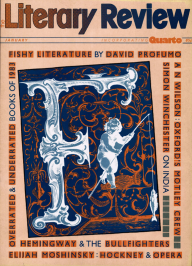Jeffrey Meyers
In the Bullring
Nobody ever lives their life all the way up except bull-fighters.
The Sun Also Rises
I went to Spain last summer to research a biography of Hemingway and to interview Antonio Ordónez and Luis Miguel Dominguin, the two greatest bullfighters since the death of Manolete in 1947. The nature of Hemingway’s relationship with these two men, whose personal and professional rivalry inspired the ‘Dangerous Summer’ articles that appeared in Life in September 1960, has never been explained. I wanted to know what these two matadors thought of Hemingway, of his knowledge of Spain, of Spanish, of bullfighting. I found their contradictory answers to my questions revealed as much about Ordónez aid Dominguin as Hemingway. In Keith Botsford’s book, Dominguin, the subject admits:
We toreros are more jealous than actors, more jealous even than prima donnas in opera. It is not just part of our nature, it is also something which others push us to, deliberately.
Dominguin speaks frankly in the book and is extremely antagonistic to Hemingway. He calls him a drunkard, liar and bore; a plagiarist, imbecile and beast. He states that Hemingway was vulgar, foulmouthed, impotent; childish, stupid and slightly mad. And he quotes Hemingway’s threat: ‘I’m going to ruin you for life, Miguel ... I’ll have you kept out of the ring.’ Dominguin maintains that Hemingway, by provoking Ordónez and promoting the ‘Dangerous Summer’ for his own profit, deliberately transformed their harmless rivalry into a fanatical fight to the death. Dominguin’s attack is too extreme to be convincing; but he does expose some of the weaknesses of the aging Hemingway and reveals how bitterly hurt he himself was by their quarrel and Hemingway’s sharp criticism of his performance in the bullring.
Dominguin is even more savage about Ordónez’s career, character and cowardice. Dominguin claims, with considerable exaggeration: ‘My father found him and made him into a torero, but I gave him his career. I took him from nowhere to as near the top as he could get with his talents ...

Sign Up to our newsletter
Receive free articles, highlights from the archive, news, details of prizes, and much more.@Lit_Review
Follow Literary Review on Twitter
Twitter Feed
It wasn’t until 1825 that Pepys’s diary became available for the first time. How it was eventually decrypted and published is a story of subterfuge and duplicity.
Kate Loveman tells the tale.
Kate Loveman - Publishing Pepys
Kate Loveman: Publishing Pepys
literaryreview.co.uk
Arthur Christopher Benson was a pillar of the Edwardian establishment. He was supremely well connected. As his newly published diaries reveal, he was also riotously indiscreet.
Piers Brendon compares Benson’s journals to others from the 20th century.
Piers Brendon - Land of Dopes & Tories
Piers Brendon: Land of Dopes & Tories - The Benson Diaries: Selections from the Diary of Arthur Christopher Benson by Eamon Duffy & Ronald Hyam (edd)
literaryreview.co.uk
Of the siblings Gwen and Augustus John, it is Augustus who has commanded most attention from collectors and connoisseurs.
Was he really the finer artist, asks Tanya Harrod, or is it time Gwen emerged from her brother’s shadow?
Tanya Harrod - Cut from the Same Canvas
Tanya Harrod: Cut from the Same Canvas - Artists, Siblings, Visionaries: The Lives and Loves of Gwen and Augustus John by Judith Mackrell
literaryreview.co.uk